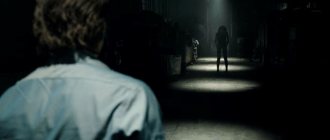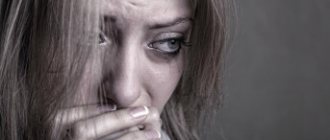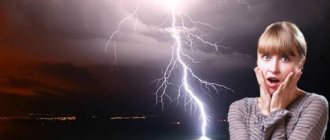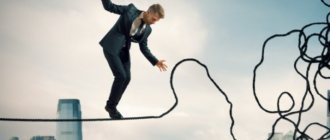The so-called “ancestral memory” makes people afraid of the dark. Firstly, the instinct of self-preservation is triggered, since danger may, purely hypothetically, lurk in the darkness. Secondly, a person intuitively avoids everything unknown, and in the darkness he loses his main analyzer - vision. So it’s quite normal not to walk down a deserted and unlit alley at midnight; startle from loud, incomprehensible sounds during sleep; not falling asleep for a long time because of watching a horror movie. But sometimes the fear of the night becomes irrational, far-fetched, groundless and subjugates a person’s will, thoughts and emotions. In such cases, a diagnosis is made - nyctophobia.
What it is
Many people don't even know what the scientific name for fear of the dark is. It turns out she has several names:
- nyctophobia is a pathological fear of the night (translated from ancient Greek “η νύχτα” - “night”, “φόβος” - “fear”);
- scotophobia is a panicky fear of the dark (translated from the ancient Greek “σκοτος” - “darkness”).
Next to these concepts, two more are often used - achluophobia and ecluophobia, which are interpreted as fear of the dark. However, their origin is unknown. If, in order to find out, we delve into historical linguistics, they can go back to one source - the word “axla”, which meant creatures from the afterlife. They accompanied a person to the “field of peace” - to death or sleep. But this is only a version unconfirmed by science, although quite substantiated.
There is a very fine line when it comes to the question of what is the difference between achluophobia and nyctophobia or between scotophobia and nyctophobia. Nyctophobes are afraid of nightfall. It is at this time of day that they begin to have panic attacks and seizures. Scoto- and achluophobes fear the darkness itself. They can get scared even during the day when they enter a room without light.
Who or what is a person suffering from these phobias afraid of? They are not afraid of the darkness itself, but of what can happen in it or who is in it. They have such a developed imagination that their sensitive nature comes up with various scary stories that are about to happen and imagines creepy monsters.
Adviсe
It is important to do everything to feel completely safe in your home.
If the phrase “I'm afraid to sleep in the dark” is familiar to you, then these tips will be very appropriate.
- As night approaches, you need to calm down, use meditation or turn on soothing music, light scented candles, and take a bath with relaxing herbs. These methods will help reduce a panic attack.
- Try switching. Turn on a good movie or chat with friends. Having a pet is also a great option.
- If the fear of the dark is somehow connected with the fear of loneliness, then you need to be with friends or family at night, then it won’t be so scary.
- Try not to disturb your night sleep, do not sleep during the day.
- If you feel fear approaching, do breathing exercises.
- Watch your diet. Eliminate junk food four hours before bed. At this time, it is permissible to drink milk or eat some fruit.
- To make it easier to be in the dark, you can use some sound effects. These include instrumental sounds, the sound of the sea, birdsong, and the operation of a fan.
- If you are afraid that someone is hiding in the dark, then make your home feel safe. To do this, put bars on the windows, hang curtains, you won’t be afraid that someone is looking at you, keep an object near your bed that, if something happens, you can protect yourself with (this is necessary for your peace of mind).
- Ventilation of the room is of great importance. In a cool room, sleep is more restful and sound.
- Before going to bed, you should only have positive thoughts; you can watch a comedy film.
- If it seems that you are hearing some sounds, find a logical explanation for them, understand that it is from the neighbors or just the sound of the wind outside the window.
Causes
The most common causes of nyctophobia and scotophobia are:
- childhood trauma associated with darkness or a room without light;
- overdeveloped imagination;
- increased emotionality, sensitivity, vulnerability;
- prolonged stress;
- existential fear of death;
- heredity;
- inert nervous system;
- features of upbringing: overly strict parents, or permission to watch horror films from early childhood, or their increased anxiety and nervousness, which are passed on to the child.
Nyctophobia often occurs against the background of various mental disorders. For example, in schizophrenia. Although there are also frequent reciprocal cases when pathological fear leads to psychopathy, weakening the nervous system and keeping a person in constant tension.
What does ignoring the problem lead to?
When faced with a cold, you feel unwell and see the consequences of the disease (sneezing, coughing, watching your throat become red, etc.). In the case of a phobia, you deny the problem more often than you admit it, attributing inappropriate reactions to a defense mechanism. This is dangerous, as it leads to a lot of negative consequences. Eg:
- The quality of life decreases.
You cannot fully rest even at night, because you do not allow your brain to relax normally by keeping the TV or light source on. You also avoid evening walks, since this time of day is “owned” by shadows and dark corners.
- The stressful environment increases.
Any fear causes stress for the body, and phobia makes it chronic. Sometimes a prolonged stressful state leads to serious heart problems, even a heart attack.
- Old age comes faster.
Photo by cottonbro: Pexels
According to American researchers, nyctophobia promotes early aging and shortens life expectancy.
If such prospects do not frighten you, think about the fact that nyctophobia can also be a symptom of schizophrenia, and this mental disorder poses a threat not only to you, but also to those around you.
Childhood nyctophobia
In children 3-4 years old, fear of the dark is normal. But if it persists after 5 years, then it is considered a pathology that requires the intervention of a psychotherapist. First of all, you need to find out the reason.
Why does a child become afraid?
- got very scared in the dark;
- constantly hears from parents scary stories that happen at night;
- read a creepy book, watched a horror movie, someone told a “horror story” - this makes a strong impression on the sensitive child’s psyche, and they begin to fear monsters in the dark;
- often stays at home alone at night;
- is experiencing severe stress (due to studies or parental divorce);
- he has nightmares;
Never force children to overcome their fear (for example, do not lock them in a dark room). This will only make the situation worse. You can't make fun of them for being afraid of a monster that doesn't exist. Because of this, internal complexes and incorrect behavior patterns are formed.
To shed light
Working with nyctophobes, psychologists note that such fear in itself does not exist. Why are people afraid of the dark - because it conceals the unknown, the ambiguity of the situation, and fear is actually associated with our feelings and fantasies. In the dark, we have difficulty oriented in space and feel vulnerable.
The real reasons for nyctophobia:
- feeling of loneliness, fear of being left without the support of loved ones;
- nervous stress in everyday life, when every little thing can throw you off balance;
- childhood traumas, for example, parents swearing loudly while the child was left alone in a dark nursery;
- feeling of insecurity due to the inability to see in the dark.
One way to stop being afraid of the dark is to remember what kind of stressful event triggered it.
It is also possible that this is a problem from the present, the solution to which you have “put on the back burner.”
One example is when a woman before giving birth is sure that the birth of a baby will ruin her relationship with a man, and this fear transforms into nyctophobia.
Signs of a phobia
The most pronounced sign of scotophobia/nyctophobia is a person persistently avoiding any darkness. Towards evening, he turns on the lights everywhere and leaves them on while he sleeps, does not go out late, does not go into rooms where it is twilight. Often justifies his actions to others. Talks about poltergeists, murders in alleys without streetlights and sleep apnea.
The sufferer's symptoms manifest themselves on two levels - mental and physiological.
Psychological:
- non-recognition of one’s pathology (it is the nyctophobe who will claim: “I’m not afraid of the dark! I’m not sick! I don’t need help!”):
- fear of being alone at home at night;
- without light - a feeling of hopelessness, despair;
- dark alleys, streets and parks are avoided even in company: a nycphobe will foam at the mouth to convince everyone of their danger;
- TV or radio is on all night;
- panic attacks when suddenly turning off the lights or entering a dark room;
- at night the door to the bedroom does not close, the curtains do not close, some kind of dim light (night light) is constantly on;
- searching for an explanation for your phobia;
- talking to yourself out loud;
- loss of self-control - inadequate, passionate desire for light;
- irrational, inexplicable rituals performed to prevent imaginary threats from the darkness.
Physiological (manifest when entering darkness, at night):
- a sharp rise in pressure;
- rapid pulse;
- tachycardia;
- muscle weakness;
- hysterics;
- tremor, trembling, chills;
- headache;
- stunned;
- loss of voice, stuttering;
- increased sweating;
- stale breath;
- insomnia, sleep apnea, nightmares;
- pain in the abdomen.
Stages of disease development:
To successfully treat nyctophobia, psychotherapists break the chain of development of the disease in the sensation-consolidation-feeling section.
Symptoms of fear of the dark
Nyctophobia begins to manifest itself in people when it gets dark. If a person does not know how to overcome the fear of the dark, he may experience:
- weakness and body aches;
- cardiopalmus;
- quite severe headache;
- abrupt change in pressure: its increase or decrease;
- stomach cramps;
- increased sweating or chills;
- stuttering or loss of voice.
Emotionally, a person suffering from a phobia may feel nervous tension, increased motor activity and fussiness. He also suffers from nightmares.
Fear of the dark test
1. Late evening. You are alone at home. Suddenly the lights went out throughout the entire street. Your actions?
- a) Go to bed.
- b) In a panic, you will start calling someone: the State Electrical Network or someone close to you. As an option, go to your neighbors. Just not to be alone!
- c) Light candles and try to distract yourself: surf social networks on your phone, listen to your player.
You had to return home late at night. It's a 10 minute walk. How will you get there?
- a) Call someone you know, wake them up and insist that they come for you.
- b) By taxi.
- c) You can get there on foot.
At night, do you open the bedroom door wide, leave the curtains open, and turn on the night light?
- a) The door is open, but the curtains are drawn and there is no night light.
- b) Yes it is.
- c) The door is closed, all the lights, even dim ones, are turned off, the curtains are drawn.
Do you watch horror movies at night?
- a) Yes.
- b) No.
- c) You try to watch during the day, but if a situation arises where the company is going to do it in the evening, you will not refuse.
What scares you in the dark?
- a) You are afraid to even talk about it.
- b) Absolutely nothing.
- c) Sometimes you may be frightened by an incomprehensible rustling sound.
Does it take you long to fall asleep?
- a) Not really.
- b) Instantly.
- c) For a very long time.
You woke up from a nightmare. Your actions?
- a) It’s hard for you to imagine this because you’ve never woken up from a nightmare.
- b) Try to fall asleep again.
- c) Drink something calming to help you fall asleep again.
In the dark, do ordinary objects often seem scary and fantastic to you? For example, is the robe a ghost?
- a) Every night.
- b) Sometimes.
- c) Never.
Calculate your points:
Interpretation of results:
- 0-5 points - you are a very brave person who has absolutely no fear of the dark, you have a strong nervous system;
- 6-11 points - you, like many people, are sometimes afraid of sharp sounds and inexplicable rustlings in the dark, but this fear does not go beyond the norm;
- 12-14 points - a state close to nyctophobia, it is worth taking measures to get rid of fear;
- 15-16 points - you suffer from nyctophobia and need to consult a specialist.
Only a psychotherapist can make a more accurate diagnosis.
How not to be afraid of the dark?
In addition to the night light, the following actions will become a “ray of light in the dark kingdom”:
- meditate, normalizing your state of mind before going to bed;
- don’t work after dinner, don’t watch horror films or news;
- pet a cat or dog;
- remove from the interior everything that can negatively affect the problem (replace dark wallpaper in the room with pastel or bright colors, add paintings or an aquarium);
- learn to sleep alone, maybe with the door ajar.
Gradually you need to reduce the amount of light: use a smaller night light or a dimmer light bulb, leave the light outside the room.
How to get rid of it?
To clarify the diagnosis, you need to make an appointment with a psychotherapist. If it is confirmed, a strategy and tactics are developed on how and with what to treat nyctophobia. Of medications, only sedatives and sleeping pills are prescribed.
What psychotherapeutic methods are used to get rid of a phobia:
- psychoanalysis;
- Gestalt therapy (if the cause is childhood trauma);
- Rational Emotive Behavioral Therapy;
- art therapy;
- play therapy;
- hypnosis;
- cognitive behavioral therapy.
The most effective way to rid children of nyctophobia and scotophobia is fairytale therapy. The psychotherapist tells instructive stories involving those monsters and fears that frighten a child in the dark. It could even be role-playing games. Gradually, the realization comes to him that this is all made up, which means it’s not scary at all.
The disorder can be overcome on your own if you use the following techniques and techniques.
- Self-reflection
The technique is performed in the first half of the day. Ask yourself: “Why am I afraid of the dark?” On a separate sheet of paper, write down your fears. Re-read each point and evaluate how real and dangerous it is for you. You will see that most of the reasons are completely unfounded. Dispel the myths and convince yourself that nothing threatens you at night.
- Evening rituals
Write down your evening in detail after dark. These should be clear, daily rituals that the body (brain, consciousness) will soon get used to and stop panicking when night falls. What actions are welcome: listen to calm, relaxing music; take an aroma bath with soothing herbs; drink a glass of warm milk; read something good and bright; play with your pet. All this relieves stress and prepares for a good, full sleep.
- Switching
Develop a specific algorithm of actions for what to do when an unaccountable wave of fear begins to roll in. For example: turn on the lights everywhere; Drink a glass of warm water in slow sips; open the window to ventilate the room; call a friend (boyfriend) or go to the neighbors to distract yourself. Write down these step-by-step instructions on paper or on your phone and keep them within reach at all times.
- Confidence
Tell someone that you suffer from scotophobia or nyctophobia. There's no shame in this. Let this be a person you trust, who will never reproach you for being sick, who will not mock you and who will not tell anyone about your problem. It's important to talk to someone.
- "Kill the Monster"
What scares you most often in the dark? If there are rustles or sounds, find their source and try to eliminate it. Noise from the street - install soundproof windows. The cat wanders around the house - for the sake of your own peace of mind, give it to someone you know and keep some fish in the aquarium. The clock is ticking loudly - replace it with others. If, when night comes, monsters are seen in pieces of furniture (hangers, mirrors, ironing boards, curtains), remove these things so that they are not visible from the bed. Or arrange everything so that the lighting falls on them differently (sometimes it is precisely this that distorts the silhouettes beyond recognition).
Independent use of the techniques and methods described above is quite possible, but not always effective. Only a psychotherapist can professionally tell you how to get rid of nyctophobia and fear of the dark forever and in the shortest possible time.
Get to know fear
Another way to stop being afraid of the dark: ask yourself the question - what exactly are you afraid of? Darkness is a screen for the projection of another fear, a picture.
Sympaty.net recommends asking as many questions as possible. What is this picture? Are you afraid of the otherworldly? What does it look like? Like the girl with long hair from the movie "The Ring"? Why does she want to drag you into TV? You didn't throw it into the well and watch the tape?










